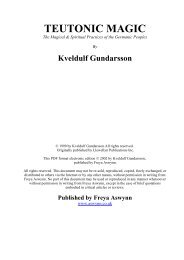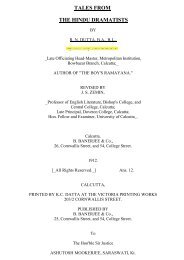Untitled - Awaken Video
Untitled - Awaken Video
Untitled - Awaken Video
Create successful ePaper yourself
Turn your PDF publications into a flip-book with our unique Google optimized e-Paper software.
Chapter 2. Connections 44<br />
philosophy. These cultures, in general, place a great amount of importance on family<br />
lineages, clan-structure, marriages (often arranged), and oral history of places<br />
and people affected by significant deeds. Often modern people when reading about<br />
these cultures misinterpret these philosophies as being form of “ancestor worship”<br />
and the long recitations of family lineages which are usually part of these cultures<br />
as being ritualized formality. What is often overlooked is that these people, by their<br />
actions, are engaging themselves in the flow of power; to do so is to directly access<br />
the Flow of the Waters of Life in the Germanic sense of “luck.” These cultures all<br />
strive to maintain or improve their luck in all areas of life.<br />
Everything has a lineage, but some lineages are simply more significant than<br />
others. To interact with a powerful lineage is a way to engage power either for<br />
evil ( unhælo) or good. The gold-hoard of Andvari the Dwarf in Wagner’s famous<br />
Niebelungenlied ( Saga of the Rheingold) was cursed upon its being stolen. That<br />
evil lineage was then melded with the lineage of an unsuspecting family when the<br />
gold was used by Óðinn, Loki, and Hnir as atonement (wergild) for death of Ottar,<br />
a son to Hreiðmar. Often, modern interpreters will attempt to show that the family<br />
somehow “deserved” the curse of Andvari’s gold, but “deserving” really had nothing<br />
to do with it. The family interacted with a powerful, evil lineage, volunteering to<br />
be blinded to the gold’s history because the satiation of their greed was foremost in<br />
their minds, and as a result, the family’s lineage became inextricably part of that<br />
cursed, evil line. On the other hand, Beowulf entwined his noble lineage with that<br />
of another, the lineage of the “giantish sword” with which he used to do battle with<br />
Grendel’s mother, and as a result, his already great power became even greater so<br />
that he was able to kill the monster which was indestructible by mere human hands.<br />
(Notice here how the “giantish sword” provides the power, but a man supplies the<br />
action.) Bauschatz relates that<br />
“the extensive description of the sword may seem strange to modern<br />
readers, because very little of it beyond the phrase ecgum þyhtig, ‘mighty<br />
with blades,’ seems to be of any direct relevance to Beowulf’s problems. All<br />
this historical, descriptive material is, however, in the Germanic context, extremely<br />
relevant. Hrunting, the sword he has tried to use against Grendel’s<br />
mother and that has failed to bite, is the very best of human swords, but<br />
it is not sufficient to the greatness of this task. Beowulf is dealing with the<br />
greater-than-human, and he needs a corresponding weapon; hence, we are<br />
explicitly told of this sword’s origin and history. This greatest of swords will<br />
provide the greatest action in the hands, naturally, of the greatest of men.<br />
As a result, the glory of the deed is shared by Beowulf and the sword.” 34<br />
34 Bauschatz, p. 100.
















